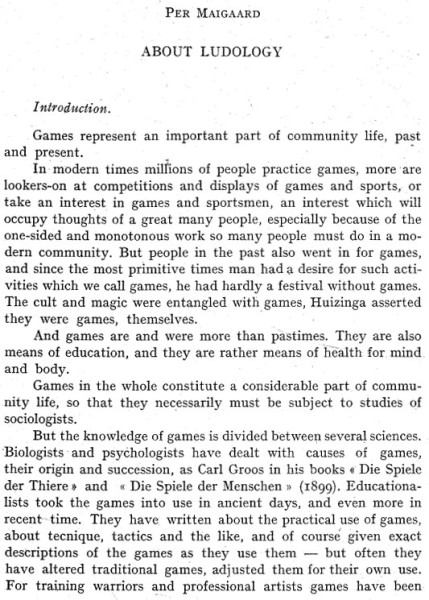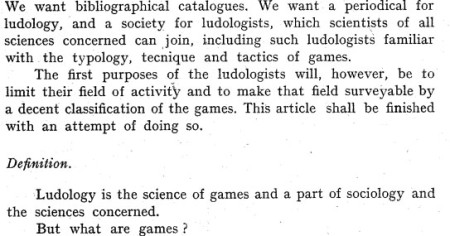About that word, ludology: A few years ago, we tried to identify the historical first use of the word. My search lead me to identify Mihaly (Flow) Csikszentmihalyi’s 1982 article “Does Being Human Matter – On Some Interpretive Problems of Comparative Ludology”.
Reading Csikszentmihalyi’s article, it always stood out that he does not seem to be introducing ludology, but writes as if this is a long-existing term that everybody knows.
In the meantime, the Oxford English Dictionary has added a ludology entry, which dates first use to 1961 in Mankind Quarterly. But was this really the first use? Again the actual text, “animal sociology, ludology and an essay on the psychology of labor and accumulation” makes it sounds like the reader is already supposed to know the word.
My further searches at first made it look like “ludology” had a special mid-20th century Indian connection, with many hits such as a 1941 article in the Calcutta Review mentioning a work “indispensable for every lover of ludology”. I was constructing a number of perfectly reasonable arguments for why this might be the case, but it turned out to be the OCR algorithm mistaking Ludology for Indology.
But I also did find an actual reference from 1951. This is Per Maigaard’s “About Ludology”, from the International Congress Of Sociology, 14th, Rome: 30th Aug.-3rd Sept. 1951. It’s not available online, but here are two excerpts.
The strange thing is how contemporary the thread of his argument is. It begins by stating the importance of games, and calling for a, yes, science of games, the establishment of ludology as a discipline. With some stylistic changes, you might have been able to sneak it into an early issue of Game Studies.
Page 1:
From page 3, including the word “ludologist” too, and a definition of ludology. And making a program for the discipline:
Maigaard’s take on that latter question is that it is too simple to say that games are distinct from work in that they are “performed out of mere desire”, because a) work is also sometimes connected with desire, and b) our desires do not appear in a vacuum, being contingent on circumstance and instincts. The closest Maigaard comes to a definition is this (he leaves it slightly open):
Now then, games are activities we perform thinking they are unnecessary and which are done from mere inclination.
This is a quite modern game definition of the subjectivist school, saying that it is not as much that games are any particular thing, but that they are the fact that we think of an activity in a particular way.
So the new date is 1951, and this article actually does define ludology. Still, I would have thought the author would account for his neologism, which he does not. So perhaps there is an even earlier source somewhere?
PS. An old article of Per Maigaard’s, discussing the historical origins of baseball was recently printed in the collection Baseball before We Knew It: A Search for the Roots of the Game.
PPS. The OED says that ludology may come from Italian ludologia ca. 1957, but I wonder if this is because Maigaard’s article was mentioned by Corrado Gini (of the Gini coefficient.) Finally, Gini notes the date as 1950, but other sources say 1951.



Per Maigaard’s article can be found here:
http://issuu.com/larskonzack/docs/maigaardludology
Thanks, Lars!
I’ve found a while ago, looking for the word “Ludologia” (in Portuguese), an article in Spanish “Ludologia y Ludoterapia”, by Jose M. Lunazzi. The article seems to be in “Boletín del Museo Social Argentino” – Vol. 34-35 – page 79, from 1947 (march/april). But I did not find any one that could access a physical copy of this Boletín to confirm.
The OCR can be found through Google Books.
The article defines “lodologia” as “la especialidad que investiga como ha jugado el hombre, cuales son las condiciones positivas de su ser ludrico, como en virtud de determinada tecnica de juego puede reaccionar contra las propias contrariedades o contra las oposiciones que le ha originado el medio social.”
@Maurício Great find. I will try to get hold of a copy. This is interesting in that it seems to introduce ludology more directly than the texts that I have found.
It is possible that the actual article is even earlier, but Google books can be very imprecise with dates:
https://www.google.com/search?q=%E2%80%9Cla+especialidad+que+investiga+como+ha+jugado+el+hombre&btnG=Search+Books&tbm=bks&tbo=1